The Nobel Peace Prize: The Nobel Peace Prize for 2019 to Ethiopian Prime Minister Abiy Ahmed Ali
Wikipedia: Abiy Ahmed
DW News: Nobel Peace Prize 2019: Who is Abiy Ahmed?
CAN: Ethiopian PM Abiy Ahmed wins Nobel Peace Prize
AFP: Africa Weekly – Nobel Prize for Abiy Ahmed and electricity in Madagascar
Nidhi Taneja @@nidhitaneja0795, New Delhi: EXPLAINED – Why Ethiopian PM Abiy Ahmed Ali has been awarded Nobel Peace Prize 2019, and not Greta Thunberg
https://www.nobelprize.org/prizes/peace/2019/press-release/
The Nobel Peace Prize for 2019
English, Norwegian
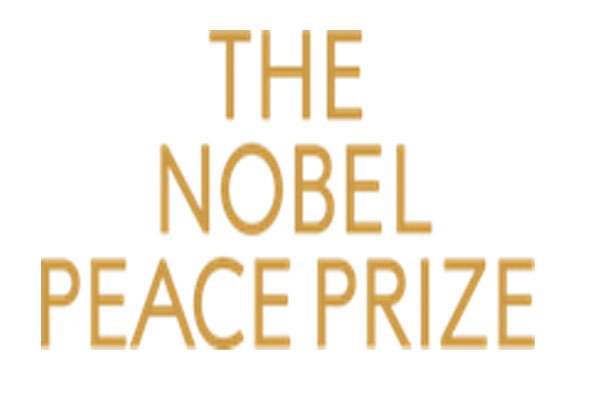
Announcement
The Norwegian Nobel Committee has decided to award the Nobel Peace Prize for 2019 to Ethiopian Prime Minister Abiy Ahmed Ali for his efforts to achieve peace and international cooperation, and in particular for his decisive initiative to resolve the border conflict with neighbouring Eritrea. The prize is also meant to recognise all the stakeholders working for peace and reconciliation in Ethiopia and in the East and Northeast African regions.
When Abiy Ahmed became Prime Minister in April 2018, he made it clear that he wished to resume peace talks with Eritrea. In close cooperation with Isaias Afwerki, the President of Eritrea, Abiy Ahmed quickly worked out the principles of a peace agreement to end the long “no peace, no war” stalemate between the two countries. These principles are set out in the declarations that Prime Minister Abiy and President Afwerki signed in Asmara and Jeddah last July and September. An important premise for the breakthrough was Abiy Ahmed’s unconditional willingness to accept the arbitration ruling of an international boundary commission in 2002.
Peace does not arise from the actions of one party alone. When Prime Minister Abiy reached out his hand, President Afwerki grasped it, and helped to formalise the peace process between the two countries. The Norwegian Nobel Committee hopes the peace agreement will help to bring about positive change for the entire populations of Ethiopia and Eritrea.
In Ethiopia, even if much work remains, Abiy Ahmed has initiated important reforms that give many citizens hope for a better life and a brighter future. He spent his first 100 days as Prime Minister lifting the country’s state of emergency, granting amnesty to thousands of political prisoners, discontinuing media censorship, legalising outlawed opposition groups, dismissing military and civilian leaders who were suspected of corruption, and significantly increasing the influence of women in Ethiopian political and community life. He has also pledged to strengthen democracy by holding free and fair elections.
In the wake of the peace process with Eritrea, Prime Minister Abiy has engaged in other peace and reconciliation processes in East and Northeast Africa. In September 2018 he and his government contributed actively to the normalisation of diplomatic relations between Eritrea and Djibouti after many years of political hostility. Additionally, Abiy Ahmed has sought to mediate between Kenya and Somalia in their protracted conflict over rights to a disputed marine area. There is now hope for a resolution to this conflict. In Sudan, the military regime and the opposition have returned to the negotiating table. On the 17th of August, they released a joint draft of a new constitution intended to secure a peaceful transition to civil rule in the country. Prime Minister Abiy played a key role in the process that led to the agreement.
Ethiopia is a country of many different languages and peoples. Lately, old ethnic rivalries have flared up. According to international observers, up to three million Ethiopians may be internally displaced. That is in addition to the million or so refugees and asylum seekers from neighbouring countries. As Prime Minister, Abiy Ahmed has sought to promote reconciliation, solidarity and social justice. However, many challenges remain unresolved. Ethnic strife continues to escalate, and we have seen troubling examples of this in recent weeks and months. No doubt some people will think this year’s prize is being awarded too early. The Norwegian Nobel Committee believes it is now that Abiy Ahmed’s efforts deserve recognition and need encouragement.
The Norwegian Nobel Committee hopes that the Nobel Peace Prize will strengthen Prime Minister Abiy in his important work for peace and reconciliation. Ethiopia is Africa’s second most populous country and has East Africa’s largest economy. A peaceful, stable and successful Ethiopia will have many positive side-effects, and will help to strengthen fraternity among nations and peoples in the region. With the provisions of Alfred Nobel’s will firmly in mind, the Norwegian Nobel Committee sees Abiy Ahmed as the person who in the preceding year has done the most to deserve the Nobel Peace Prize for 2019.
Oslo, 11 October 2019
To cite this section
MLA style: The Nobel Peace Prize for 2019. NobelPrize.org. Nobel Media AB 2019.
Sun. 13 Oct 2019. https://www.nobelprize.org/prizes/peace/2019/press-release/
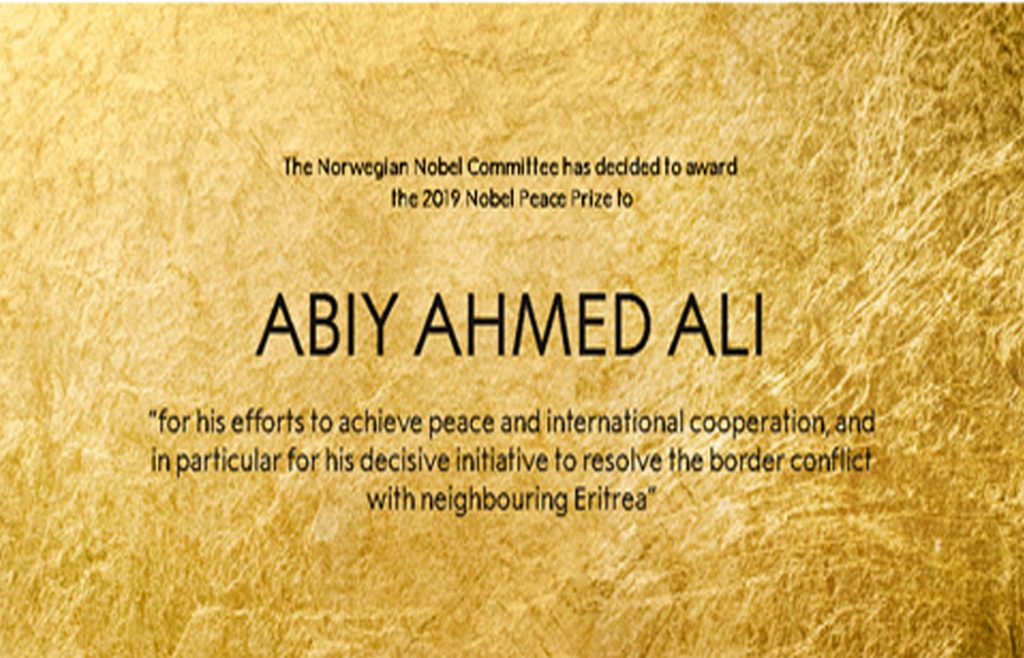
Abiy Ahmed Ali: “I was so humbled and thrilled when I just heard the news.”
Oct 11, 2019 Nobel Prize
Listen to the call between Ethiopian Prime Minister Abiy Ahmed Ali and Olav Njølstad, Secretary of the Norwegian Nobel Committee, recorded shortly after the public announcement of the 2019 Nobel Peace Prize.
Category Education
Abiy Ahmed Ali: “Peace is a very expensive commodity in my country.”
Oct 11, 2019 Nobel Prize
Immediately after hearing news of the award of Nobel Peace Prize, Ethiopian Prime Minister Abiy Ahmed Ali answered two quick questions from Adam Smith. He describes the encouragement and energy that the prize will provide, both to his and others’ ongoing efforts towards achieving peace in their region, and to those who are trying to work for peace worldwide. Copyright Nobel Media
Category Education
Announcement of the Nobel Peace Prize 2019
Streamed live on Oct 11, 2019
The Nobel Peace Prize 2019 was awarded to Abiy Ahmed Ali “for his efforts to achieve peace and international cooperation, and in particular for his decisive initiative to resolve the border conflict with neighbouring Eritrea.” The Nobel Peace Prize 2019 was announced at The Norwegian Nobel Institute in Oslo, Norway. #nobelprize
Category Education
Abiy Ahmed
From Wikipedia, the free encyclopedia
Jump to navigation Jump to search
This article is about a person whose name ends in a patronymic rather than a family name. The article properly refers to the person by his given name, Abiy, and not as Ahmed.
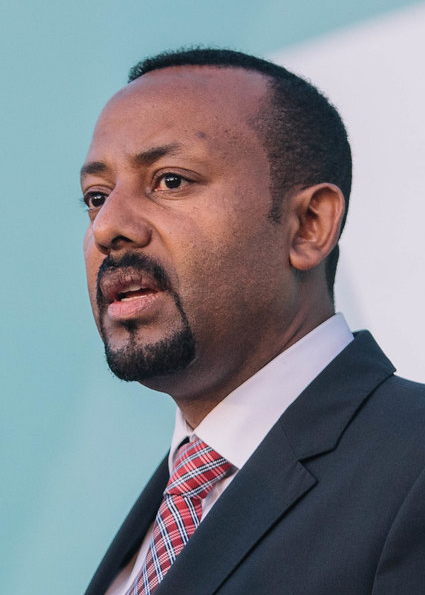
| Abiy Ahmed ??? ???? ?? | |
| 15th Prime Minister of Ethiopia | |
| Incumbent | |
|
Assumed
office 2 April 2018 | |
| President |
Mulatu Teshome Sahle-Work Zewde |
| Deputy | Demeke Mekonnen |
| Preceded by | Hailemariam Desalegn |
| 3rd Chairman of the Ethiopian People’s Revolutionary Democratic Front | |
| Incumbent | |
|
Assumed
office 27 March 2018 | |
| Deputy | Demeke Mekonnen |
| Preceded by | Hailemariam Desalegn |
| Leader of the Oromo Democratic Party | |
| Incumbent | |
|
Assumed
office 22 February 2018 | |
| Deputy | Lemma Megersa |
| Preceded by | Lemma Megersa |
| Minister of Science and Technology | |
|
In
office 6 October 2015 – 1 November 2016 | |
| Prime Minister | Hailemariam Desalegn |
| Preceded by | Demitu Hambisa |
| Succeeded by | ??? |
|
Director of the Information Network
Security Agency Acting | |
|
In
office 2008–2015 | |
| Preceded by | Teklebirhan Woldearegay |
| Succeeded by | ??? |
| Personal details | |
| Born |
15 August 1976 (age 43) Beshasha, Ethiopia |
| Political party | Oromo Democratic Party |
|
Other
political affiliations | Ethiopian People’s Revolutionary Democratic Front |
| Spouse(s) | Zinash Tayachew |
| Children |
3 daughters 1 adopted son |
| Education |
Microlink Information Technology
College (BA) University of Greenwich (MA) Ashland University (MBA) Addis Ababa University (PhD) |
| Awards | Nobel Peace Prize (2019) |
| Website | Official website |
| Military service | |
| Allegiance | Ethiopia |
| Branch/service | Ethiopian Army |
| Years of service | 1991–2010 |
| Rank | Lieutenant Colonel |
| Unit | Army Signals Corps |
| Commands | Information Network Security Agency |
| Battles/wars |
Ethiopian Civil War United Nations Assistance Mission for Rwanda Eritrean–Ethiopian War |
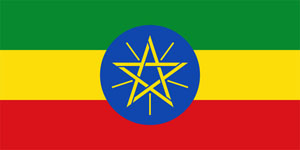
Ethiopian Flag
Abiy Ahmed Ali[pronunciation?] (Amharic: ??? ???? ?? [?a.bij ?ah.mad ?a.li], Oromo: Abiyyii Ahimad Alii, often shortened to Abiy Ahmed or just Abiy; born 15 August 1976) is an Ethiopian politician serving since 2 April 2018 as the fourth[1] and current prime minister[2] of the Federal Democratic Republic of Ethiopia. He is chairman of both the ruling EPRDF (Ethiopian People’s Revolutionary Democratic Front)[3] and the ODP (Oromo Democratic Party) (which is one of the four coalition parties of the EPRDF).[4] Abiy is also an elected member of the Ethiopian parliament, and a member of the ODP and EPRDF executive committees.
A former army intelligence officer, since becoming prime minister Abiy has launched a wide programme of political and economic reforms,[5] not all of which have met with favour by supporters of the federalism-based constitution/system of Ethiopia and in Tigray (in which Abiy’s shake-up of the Ethiopian state that has targeted Tigrayans is seen as selective).[6][7]
Abiy was awarded the 2019 Nobel Peace Prize for his work in ending the 20-year post-war territorial stalemate between Ethiopia and Eritrea.[8]
Personal life and education – Early life
Abiy Ahmed was born in the town of Beshasha[9] in the historic Kaffa Province (in the present-day Jimma Zone, Oromia Region) of Ethiopia on 15 August 1976.[10][11] His deceased father, Ahmed Ali, was a Muslim Oromo[12] (and had four wives[13]), while his deceased mother, Tezeta Wolde,[14] was an Orthodox[15] Christian Amhara.[16][17]
Abiy is the 13th child of his polygamous father and the sixth and youngest child of his mother.[9][16] His childhood name was Abiyot (English: “Revolution”). The name was sometimes given to children in the aftermath of the Derg revolution of 1974.[9] The then Abiyot went to the local primary school and later continued his studies at secondary schools in Agaro town. Abiy, according to several personal reports, was always very interested in his own education and later in his life also encouraged others to learn and to improve.[9]
Education
While serving in the Ethiopian National Defense Force, Abiy received his first degree, a Bachelor’s degree in computer engineering[18] from the Microlink Information Technology College in Addis Ababa in 2001.[19]
Abiy holds a Master of Arts in Transformational Leadership[18] earned from the business school at Greenwich University, London, in collaboration with the International Leadership Institute, Addis Ababa, in 2011. He also holds a Master of Business Administration[18] from the Leadstar College of Management and Leadership in Addis Ababa in partnership with Ashland University in 2013.[19]
Abiy, who had started his Doctor of Philosophy (Ph.D.) work several years ago as a regular student,[20] completed his Ph.D. in 2017 at the Institute for Peace and Security Studies, Addis Ababa University. He did his Ph.D. work on the Agaro constituency with the PhD thesis entitled “Social Capital and its Role in Traditional Conflict Resolution in Ethiopia: The Case of Inter-Religious Conflict In Jimma Zone State”. As a follow-up to his Ph.D. thesis, he published a research article on de-escalation strategies in the Horn of Africa in a special journal issue dedicated to countering violent extremism.[21]
Personal life
He met and married his wife, Zinash Tayachew, an Amhara woman from Gondar,[22][9][16] while both were serving in the Ethiopian Defense Forces.[23] They are the parents of three daughters and one recently adopted son.[23] Abiy is multilingual and speaks Afaan Oromo, Amharic, Tigrinya, and English.[24] He is a fitness aficionado and professes that physical health goes hand in hand with mental health and, as such, he frequents physical and gym activities in Addis Ababa.[23] Abiy is a devout Evangelical Pentecostal Christian of the Full Gospel Believers’ Church.[25]
Military career
As a teenager and in early 1991,[26] he joined the armed struggle against the Marxist–Leninist regime of Mengistu Haile Mariam after the death of his oldest brother. He did so as a member of ODP (Oromo Democratic Party), which at that time was a tiny organization of only around 200 fighters in the large coalition army of about 100,000 fighters that resulted in the regime’s fall later that year.[24][9][23] As there were only so few ODP fighters in an army with its core of about 90,000 Tigrayans, Abiy quickly had to learn the Tigrinya language. As a speaker of Tigrinya in a security apparatus dominated by Tigrayans, he could move forward with his military career.[24]
After the fall of the Derg, he took formal military training from Assefa Brigade in West Wollega and was stationed there. His military post was in intelligence and communications. Later on he became a soldier in the now Ethiopian National Defense Force in 1993 and worked mostly in the intelligence and communications departments. In 1995, after the Rwandan genocide, he was deployed as a member of the United Nations Peace Keeping Force (UNAMIR), Kigali, Rwanda.[27] In the Ethio-Eritrea War between 1998 and 2000, he led an intelligence team to discover positions of the Eritrean Defence Forces.[28]
Later on, Abiy was posted back to his home town of Beshasha, where he – as an officer of the Defense Forces – had to address a critical situation of inter-religious clashes between Muslims and Christians with a number of deaths.[24][29] He brought calm and peace in a situation of communal tensions accompanying the clashes.[24] In later years, following his election as an MP, he continued these efforts to bring about reconciliation between the religions through the creation of the Religious Forum for Peace.[28]
In 2008, Abiy was one of the co-founders of the Ethiopian Information Network Security Agency (INSA), where he worked in different positions.[9] For two years, he was acting director of INSA due to a leave of absence of the director assigned to the post.[9] In this capacity, he was board member of several government agencies working on information and communications, like Ethio Telecom and Ethiopian Television. In 2010, Abiy eventually decided to leave the military and his post as deputy director of INSA to become a politician. The highest rank he had achieved during his military career was that of a Lieutenant Colonel.[21][24]
Political career
Member of Parliament
He started his political career as a member of the ODP (Oromo Democratic Party).[30] The ODP is the ruling party in Oromia Region since 1991 and also one of four coalition parties of the ruling coalition in Ethiopia, the EPRDF (Ethiopian People’s Revolutionary Democratic Front). He became a member of the central committee of ODP and congress member of the Executive Committee of the EPRDF – in quick succession.[24]
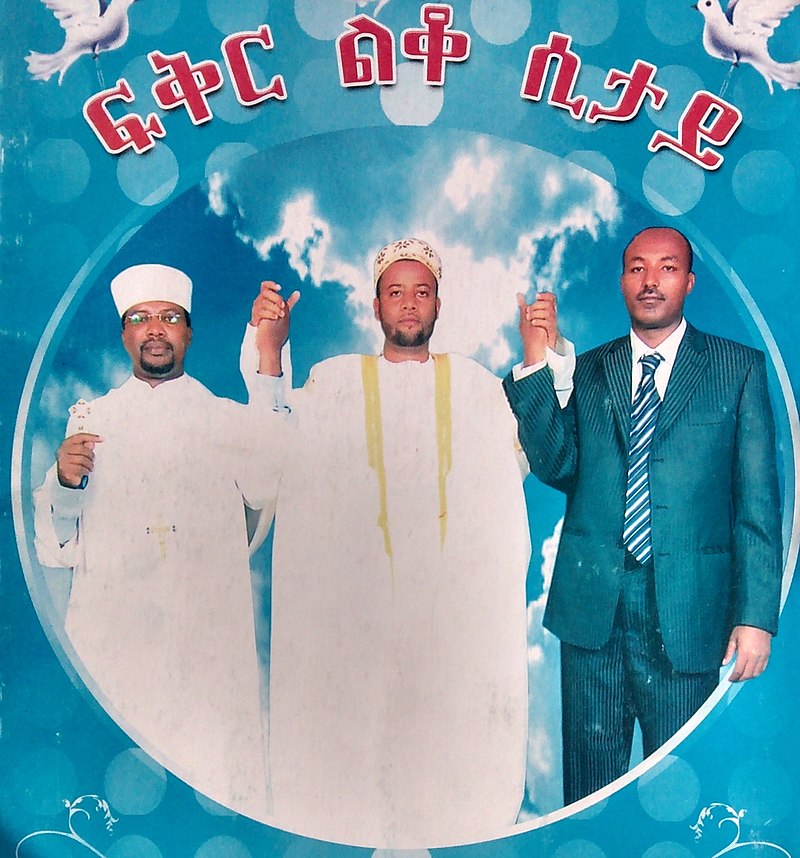
Religious Forum for Peace with Abiy Ahmed (2010)
In the 2010 national election, Abiy represented the woreda of Agaro and became an elected member of the House of Peoples’ Representatives, the lower chamber of the Ethiopian Federal Parliamentary Assembly. Before and during his time of parliamentary service, there were several religious clashes among Muslims and Christians in Jimma zone. Some of these confrontations turned violent and resulted in the loss of life and property. Abiy, as an elected member of parliament took a proactive role in working with several religious institutions and elders to bring about reconciliation in the zone. He was then setting up a forum entitled “Religious Forum for Peace”, an outcome of the need to devise a sustainable resolution mechanism to restore peaceful Muslim-Christian community interaction in the region.[21]
In 2014, during his time in parliament, Abiy became the Director General of a new and in 2011 founded Government Research Institute called Science and Technology Information Center (STIC).[9][31] The year after, in 2015, Abiy became an executive member of ODP. The same year he was elected to the House of Peoples’ Representatives for a second term, this time for his home woreda of Gomma.[32]
Rise to power
Starting from 2015, Abiy became one of the central figures in the violent fight against illegal land grabbing activities in Oromia Region and especially around Addis Ababa. Although the Addis Ababa Master Plan at the heart of the land-grabbing plans was stopped in 2016, the disputes continued for some time resulting in injuries and deaths.[33] It was this fight against land-grabbing, that finally boosted Abiy’s political career, brought him into the spotlight and allowed him to climb the political ladder.[24]
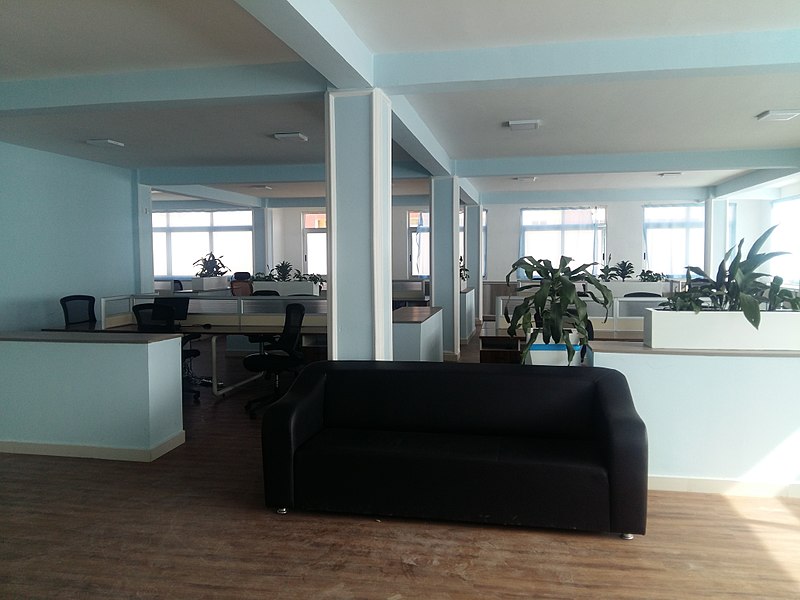
Oromia Urban Development and Planning Office
In October 2015, Abiy became the Ethiopian Minister of Science and Technology (MoST), a post which he left after only 12 months. From October 2016 on, Abiy served as Deputy President of Oromia Region as part of the team of Oromia Region’s president Lemma Megersa while staying a member of the Ethiopian Federal House of Peoples’ Representatives.[34][35] Abiy also became the head of the Oromia Urban Development and Planning Office. In this role, Abiy was expected to be the major driving force behind Oromia Economic Revolution, Oromia Land and Investment reform, youth employment as well as resistance to widespread land grabbing in Oromia region.[36] As one of his duties in office, he took care of the displaced one million Oromo people from Somali region during the 2017 unrest.[37]
As head of ODP Secretariat from October 2017, Abiy crossed over religious and ethnic divides to facilitate the formation of a new alliance between Oromo and the Amhara groups, both making up two thirds of the 100 million Ethiopian population.[38]
In early 2018, a lot of political observers considered Abiy and Lemma as the most popular politicians within the majority of the Oromo community and other Ethiopian communities.[39][40] This came after several years of unrest in Ethiopia. But despite this favourable rating for Abiy and Lemma, young people from Oromia Region called for immediate action without delays to bring fundamental change and freedom to Oromia Region and Ethiopia – otherwise more unrest was to be expected.[33] According to Abiy himself, people are asking for a different rhetoric, with an open and respectful discussion in the political space to allow political progress and to win people for democracy instead of pushing them.[33]
Until early 2018, Abiy continued to serve as head of the ODP secretariat and of the Oromia Housing and Urban Development Office and as Deputy President of Oromia Region. Then he left all these posts after his election as Leader of EPRDF.[41][34]
EPRDF leadership election
Following three years of protest and unrest, on 15 February 2018 the Ethiopian Prime Minister, Hailemariam Desalegn, announced his resignation – meaning that he also resigned from the post of EPRDF Chairman. Historically, the incoming EPRDF Chairman is the next Prime Minister. The EPRDF Chairman on the other hand is one of the heads of the four parties that make up the ruling coalition: ODP, ADP, SEPDM and TPLF.[42]
Hailemariam’s resignation triggered the first ever contested leadership election among EPRDF coalition members to replace him. A lot of political observers made Lemma Megersa (the ODP Chairman) and Abiy the front-runners to become the Leader of the ruling coalition and eventually Prime Minister of Ethiopia. Despite being the clear favourite for the general public, Lemma Megersa was not a member of the national parliament, a pre-condition to become Prime Minister as required by the Ethiopian constitution. Therefore, Lemma was excluded from the leadership race.[43] On 22 February 2018, Lemma’s party, ODP, called for an emergency executive committee meeting and replaced Lemma as Chairman of ODP with Abiy. Abiy had the advantage of being a Member of Parliament in contrast to Lemma, and some observers saw that as a strategic move by the ODP to retain its leadership role within the coalition and to promote Abiy to become Prime Minister.[32]
On 1 March 2018, the 180 EPRDF executive committee members started their meeting to elect the leader of the party. Each of the four parties sent in 45 members. The contest for the leadership was among Abiy of ODP, Demeke Mekonnen, the Deputy Prime Minister and ADP leader, Shiferaw Shigute as Chairman of SEPDM and Debretsion Gebremichael as the Leader of TPLF. Despite being the overwhelming favorite by the majority of Ethiopians, Abiy faced major opposition from TPLF and SEPDM members during the leadership discussions.[44]
On 27 March 2018, a few hours before the beginning of the leadership elections, Demeke Mekonnen, who had been seen as the major opponent to Abiy, dropped out of the race. Many observers saw this as an endorsement of Abiy. Demeke was then approved as Deputy Prime Minister and got another term in that post. Following Demeke’s exit, Abiy received a presumably unanimous vote from both the ADP and ODP executive members, with 18 additional votes in a secret ballot coming from elsewhere. By midnight, Abiy was declared Chairman of the ruling coalition in Ethiopia, the EPRDF, and was considered as the Prime Minister Designate of Ethiopia by receiving 108 votes while Shiferaw Shigute received 58 and Debretsion Gebremichael received 2 votes.[3] On 2 April 2018, Abiy was elected as Prime Minister of Ethiopia by the House of Representatives and sworn in.[2]
Prime Minister of Ethiopia
On 2 April 2018, Abiy was confirmed and sworn in by the Ethiopian parliament as Prime Minister of Ethiopia. During his acceptance speech, he promised political reform; to promote the unity of Ethiopia and unity among the peoples of Ethiopia; to reach out to the Eritrean government to resolve the ongoing Eritrean–Ethiopian border conflict after the Eritrean–Ethiopian War and to also reach out to the political opposition inside and outside of Ethiopia. His acceptance speech sparked optimism and received an overwhelmingly positive reaction from the Ethiopian public including the opposition groups inside and outside Ethiopia. Following his speech, his popularity and support across the country reached an historical high and some political observers argued that Abiy was overwhelmingly more popular than the ruling party coalition, the EPRDF.[3]
Domestic policy
Since taking office in April 2018, Abiy’s government has presided over the release of thousands of political prisoners from Ethiopian jails and the rapid opening of the country’s political landscape.[45][46][47] In May 2018 alone the Oromo region pardoned over 7,600 prisoners.[48] On 29 May Ginbot 7 leader Andargachew Tsege, facing the death penalty on terrorism charges, was released after being pardoned by President Mulatu Teshome, along with 575 other detainees.[49]
That same day, charges were dropped against Andargachew’s colleague Berhanu Nega and the Oromo dissident and public intellectual Jawar Mohammed, as well as their respectively affiliated US-based ESAT and OMN satellite television networks.[50] Shortly thereafter, Abiy took the “unprecedented and previously unimaginable” step of meeting Andargachew, who twenty-four hours previously had been on death row, at his office; a move even critics of the ruling party termed “bold and remarkable”.[51] Abiy had previously met former Oromo Liberation Front leaders including founder Lencho Letta, who had committed to peaceful participation in the political process, upon their arrival at Bole International Airport.[52]
On 30 May 2018, it was announced the ruling party would amend the country’s “draconian” anti-terrorism law, widely perceived as a tool of political repression. On 1 June 2018, Abiy announced the government would seek to end the state of emergency two months in advance of the expiration its six-month tenure, citing an improved domestic situation. On 4 June 2018, Parliament approved the necessary legislation, ending the state of emergency.[47] In his first briefing to the House of Peoples’ Representatives in June 2018, Abiy countered criticism of his government’s release of convicted “terrorists” which according to the opposition is just a name the EPRDF gives you if you are a part or even meet the “opposition”. He argued that policies that sanctioned arbitrary detention and torture themselves constituted extra-constitutional acts of terror aimed at suppressing opposition.[53] This followed the additional pardon of 304 prisoners (289 of which had been sentenced on terrorism-related charges) on 15 June.[54]
The pace of reforms has revealed fissures within the ruling coalition, with hardliners in the military and the hitherto dominant TPLF said to be “seething” at the end of the state of emergency and the release of political prisoners.[55] These hardliners, centered around TPLF chief Debretsion Gebremichael, had grown to deeply resent the leadership of Abiy’s predecessor Hailemariam (at times supposedly bringing him to the brink of tears), and had hoped to place a more assertive figure in the prime minister’s office willing to “act with an iron fist”, rather than a reformist.[56]
An editorial on the previously pro-government website Tigrai Online arguing for the maintenance of the state of emergency gave voice to this sentiment, saying that Abiy was “doing too much too fast”.[57] Another article critical of the release of political prisoners suggested that Ethiopia’s criminal justice system had become a revolving door and that Abiy’s administration had quite inexplicably been rushing to pardon and release thousands of prisoners, among them many deadly criminals and dangerous arsonists.[58] On 13 June 2018, the TPLF executive committee denounced the decisions to hand over Badme and privatize SOEs as “fundamentally flawed”, saying that the ruling coalition suffered from a fundamental leadership deficit.[59]
Constitutional reform
In his briefing to parliament of 18 June 2018, Abiy announced that he would set up a commission aimed at reviewing the divisive system of ethnic federalism, which he said was failing to adequately deal with the proliferation of localized disputes over which particular ethnicity was entitled to control certain towns and districts, potentially paving the way for sweeping constitutional reform.[60]
Economic reforms
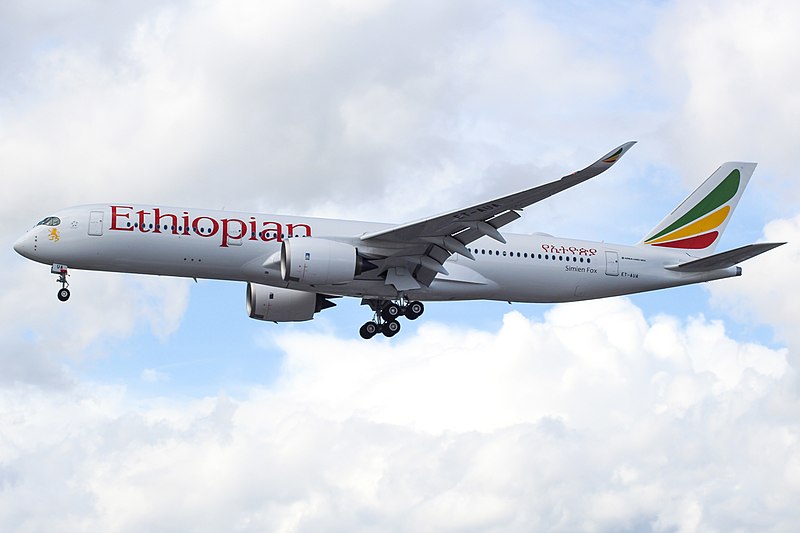
Abiy has announced that state-owned enterprises such as Ethiopian Airlines are to be partially or wholly privatised.
In June 2018, the ruling coalition announced its intention to pursue the large-scale privatisation of state-owned enterprises and the liberalization of several key economic sectors long considered off-limits, marking a landmark shift in the country’s state-oriented development model.[61]
State monopolies in the telecommunications, aviation, electricity, and logistics sectors are to be ended and those industries opened up to private sector competition.[62] Shares in the state-owned firms in those sectors, including Ethiopian Airlines, Africa’s largest and most profitable, are to be offered for purchase to both domestic and foreign investors, although the government will continue to hold a majority share in these firms, thereby retaining control of the commanding heights of the economy.[63] State-owned enterprises in sectors deemed less critical, including railway operators, sugar, industrial parks, hotels and various manufacturing firms, may be fully privatised.[64]
Aside from representing an ideological shift with respect to views on the degree of government control over the economy, the move was seen as a pragmatic measure aimed at improving the country’s dwindling foreign-exchange reserves, which by the end of the 2017 fiscal year were equal in value to less than two months worth of imports, as well as easing its growing sovereign debt load.[63][61]
In June 2018, Abiy announced the government’s intention to establish an Ethiopian stock exchange in tandem with the privatization of state-owned enterprises.[60] As of 2015 Ethiopia was the largest country in the world, in terms of both population and gross domestic product, without a stock exchange.[65]
Foreign policy
In May 2018, Abiy visited Saudi Arabia, receiving guarantees for the release of Ethiopian prisoners including billionaire entrepreneur Mohammed Hussein Al Amoudi, who was detained following the 2017 Saudi Arabian purge.[45]
In June 2018, he met with Egyptian President Abdel Fattah el-Sisi in Cairo and, separately, brokered a meeting in Addis Ababa between the South Sudanese president Salva Kiir and rebel leader Rieck Machar in an attempt to encourage peace talks.[66]
Djibouti and port agreements
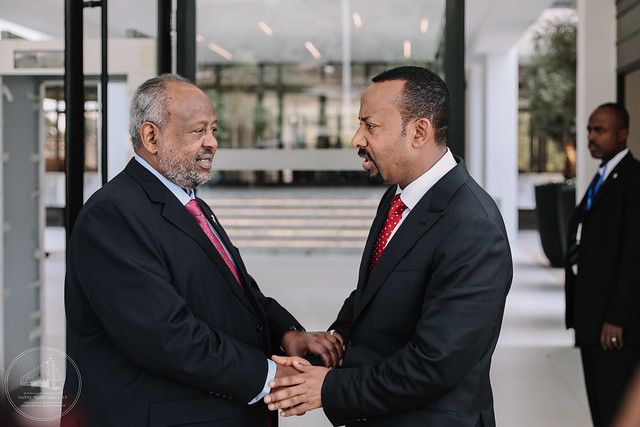
Abiy with President Guelleh of Djibouti
Since taking power Abiy has pursued a policy of expanding landlocked Ethiopia’s access to ports in the Horn of Africa region. Shortly before his assumption of office it was announced that the Ethiopian government would take a 19% stake in Berbera Port in the unrecognized Republic of Somaliland as part of a joint venture with DP World.[67] In May 2018, Ethiopia signed an agreement with the government of Djibouti to take an equity stake in the Port of Djibouti, enabling Ethiopia to have a say in the port’s development and the setting of port handling fees.[68]
Two days later a similar agreement was signed with the Sudanese government granting Ethiopia an ownership stake in the Port of Port Sudan. The Ethio-Djibouti agreement grants the Djiboutian government the option of taking stakes in state-owned Ethiopian firms in return, such as the Ethiopian Airlines and Ethio Telecom.[69] This in turn was followed shortly thereafter by an announcement that Abiy and Kenyan President Uhuru Kenyatta had reached an agreement for the construction of an Ethiopian logistics facility at Lamu Port as part of the Lamu Port and Lamu-Southern Sudan-Ethiopia Transport Corridor (LAPSSET) project.[70]
The potential normalization of Ethiopia-Eritrea relations likewise opens the possibility for Ethiopia to resume using the Ports of Massawa and Asseb, which, prior to the Ethio-Eritrean conflict, were its main ports, which would be of particular benefit to the northern region of Tigray.[61] All these developments would reduce Ethiopian reliance on Djibouti’s port which, since 1998, has handled almost all of Ethiopia’s maritime traffic.[71][69]
Eritrea
Main articles: Eritrea–Ethiopia relations and 2018 Eritrea–Ethiopia summit
Upon taking office, Abiy stated his willingness to negotiate an end to the Ethio-Eritrean conflict. In June 2018, it was announced that the government had agreed to hand over the disputed border town of Badme to Eritrea, thereby complying with the terms of the 2000 Algiers Agreement to bring an end to the state of tension between Eritrea and Ethiopia that had persisted despite the end of hostilities during the Ethiopia-Eritrea War.[61] Ethiopia had until then rejected the international boundary commission’s ruling awarding Badme to Eritrea, resulting in a frozen conflict (popularly termed a policy of “no war, but no peace”) between the two states.[72]
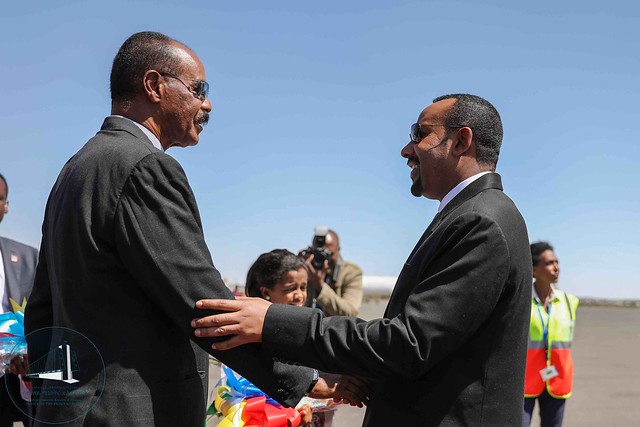
Abiy and President Isaias Afwerki of Eritrea
During the national celebration on 20 June 2018, the president of Eritrea, Isaias Afwerki, accepted the peace initiative put forward by Abiy and suggested that he would send a delegation to Addis Ababa. On 26 June 2018, Eritrean Foreign Minister Osman Saleh Mohammed visited Addis Ababa in the first Eritrean high-level delegation to Ethiopia in over two decades.[73]
In Asmara, on 8 July 2018, Abiy became the first Ethiopian leader to meet with an Eritrean counterpart in over two decades, in the 2018 Eritrea–Ethiopia summit.[74] The very next day, the two signed a “Joint Declaration of Peace and Friendship” declaring an end to tensions and agreeing, amongst other matters, to re-establish diplomatic relations; reopen direct telecommunication, road, and aviation links; and facilitate Ethiopian use of the ports of Massawa and Asseb.[75][76][77] Abiy was awarded the Nobel Peace Prize in 2019 for his efforts in ending the war.[8]
Religious harmony
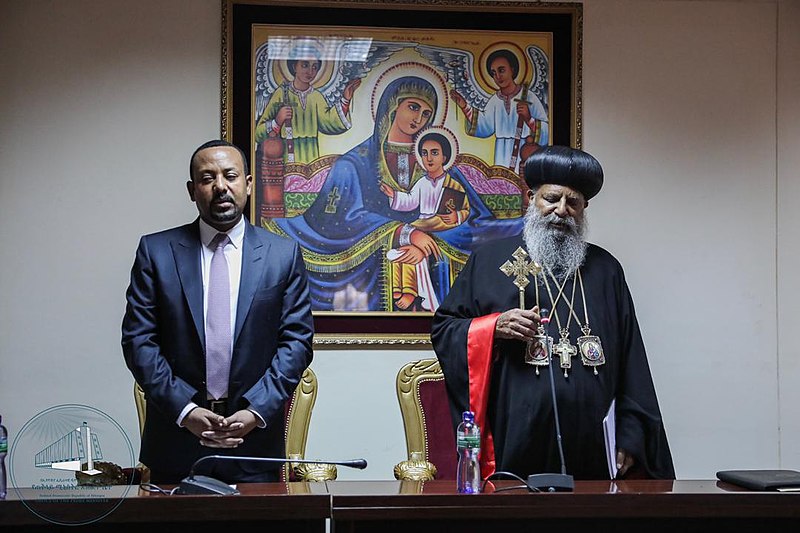
Abiy with one of the Patriarchs of the Orthodox Tewahedo Church
Ethiopia is a country of various religious groups, primarily Christian and Muslim communities. Both inter-religious and intra-religious divisions and conflicts were a major concern, where both the Ethiopian Orthodox Tewahedo Church and the Ethiopian Islamic Council experienced religious and administrative divisions and conflicts.[78][79] In 2018, he was given a special “peace and reconciliation” award by the Ethiopian Church for his work in reconciliating rival factions within the church.[80]
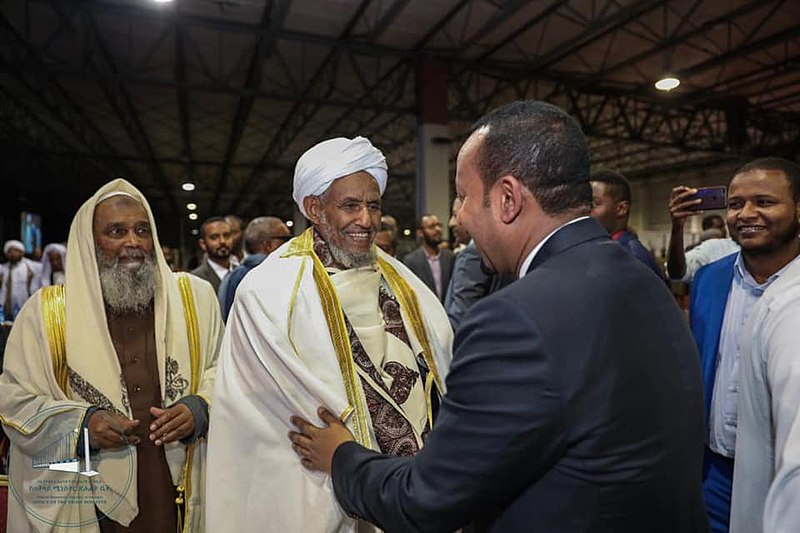
Abiy with the Ethiopian Muslim Grand Mufti
Security sector reform
In June 2018, Abiy, speaking to senior commanders of the Ethiopian National Defense Force (ENDF) declared his intention to carry out reforms of the military to strengthen its effectiveness and professionalism, with the view of limiting its role in politics. This followed renewed calls both within Ethiopia and from international human rights groups, namely Amnesty International, to dissolve highly controversial regional militias such as the Liyyu force.[81] This move is considered likely to face resistance from TPLF hardliners, who occupy much of the military high command.[82]
Notably, he has also called for the eventual reconstitution of the Ethiopian Navy, dissolved in 1996 in the aftermath of Eritrea’s secession after an extraterritorial sojourn in Djibouti, saying that “we should build our naval force capacity in the future.”[83] It was reported that this move would appeal to nationalists still smarting from the country’s loss of its coastline 25 years prior. Ethiopia already has a maritime training institute on Lake Tana as well as a national shipping line.
On 7 June 2018, Abiy carried out a wide-ranging reshuffle of top security officials, replacing ENDF Chief of Staff Samora Yunis with Lieutenant General Se’are Mekonnen, National Intelligence and Security Service (NISS) director Getachew Assefa with Lieutenant General Adem Mohammed, National Security Advisor and former army chief Abadula Gemeda, and Sebhat Nega, one of the founders of the TPLF and director-general of the Foreign Relations Strategic Research Institute[84][85] Sebhat’s retirements had been previously announced that May.[86]
Grenade attack
A large peaceful demonstration was organized in Addis Ababa at Meskel Square on 23 June 2018 to show support for the new prime minister. Just after Abiy had finished addressing the crowd a grenade was thrown and landed just 17 metres away from where he and other top officials were sitting. Two people were killed and over 165 were injured. Following the attack, 9 police officials were detained, including the deputy police commissioner, Girma Kassa, who was fired immediately. Questions were asked as to how a police car carrying attackers got so close to the prime minister and soon after the car was set alight destroying evidence. After the attack the prime minister addressed the nation on national TV unhurt by the blast and describing it as an “unsuccessful attempt by forces who do not want to see Ethiopia united”. On the same day the prime minister made an unannounced visit to the Black Lion general hospital to meet victims of the attack.[87][88][89][90]
Cabinet reshuffle
In the parliamentary session held on 16 October 2018, Abiy proposed to reduce the number of ministries from 28 to 20 with half of the cabinet positions for female ministers, a first in the history of the country.[91] The new cabinet restructure included the first female president, Sahle-Work Zewde; the first female minister of the Ministry of Defense, Aisha Mohammed Musa;[92] the first female minister of the new Ministry of Peace, Muferiat Kamil responsible for the Ethiopian Federal Police and the intelligence agencies; the first female press secretary for the Office of the Prime Minister, Billene Seyoum Woldeyes.[93]
Increasing ethnic unrest
The internal political power shift has created fears for Tigrayans, and already “simmering anti-Tigrayan sentiments have led to violence” people told IRIN, “from barricading roads and forcibly stopping traffic to looting and attacks on Tigrayan homes and businesses in the Amhara and Oromia regions”. Tens of thousands Ethiopian Tigrayans have been displaced from their homes (or killed), due to ethnic based violence, since Abiy assumed office.[94][95][96][97]
Since the 2018 election of Abiy, around 1.5 million Ethiopians were forced from their homes by ethnic violence – the highest number of internally displaced persons (IDPs) of any country in 2018.[98][99][100][101][102]
Some of the worst calamities were in the south, where more than 800,000 Ethiopian Gedeos[103] have fled from the district of West Guji amid persecution by the Oromo Liberation Front. Abiy’s government has been accused by humanitarian groups of ignoring the ethnic violence and withholding of aid from Gedeon refugees.[104][105]
In the north of Ethiopia, and especially in Tigray which was the cradle of the successful revolt against the Derg that in 1991 put in place the current governing coalition, there are reports of increasing anger and ethnic tension as Abiy’s shake-up of the Ethiopian state, which has targeted Tigrayans in top positions, is widely seen as biased and vindictive.[6][106]
Government spokesmen have countered that there are many ex-officials accused of amassing billions in the past decades that are wanted by law enforcement on corruption charges and that many of these defendants come from the ruling Tigrayan elite of the past decades. These legal proceedings are sometimes conflated with ethnic persecution, especially by those ex-officials that fear persecution.[107]
Debretsion Gebremichael, the acting President of Tigray Region and currently chairman of the Tigray People’s Liberation Front (TPLF) and part of the EPRDF ruling coalition, has been reported as having accused prime minister Abiy of “conducting ethnic profiling in the name of fighting corruption” and described “recent arrests of senior military officials as being politically motivated and implemented along ethnic lines”,[108] and his criticisms are echoed by other prominent TPLF members and people of Tigray.[109][110][111][7] A local University law professor that IRIN talked to, added and said “there is a lot of [lies] and propaganda, and the TPLF has been made the scapegoat for all vice”.[94] Abiy has also sacked around 160 Tigrayan army Generals and much more lower ranking army officers, in his reforms.[106]
In a March 2019 interview with the Financial Times of London, Debretsion Gebremichael said “concentrating on one ethnic group is dangerous”, when talking about Abiy’s crack-down on Tigrayan government workers and politicians, and the fact that Abiy is calling them “daytime hyenas” (a phrase being interpreted as an ethnic slur).[112]
Awards
| Award | Awarding institution | Date |
| Most Excellent Order of the Pearl of Africa: Grand Master[113] | Uganda | 9 June 2018 |
| Order of the Zayed Medal[114] | UAE Crown Prince | 24 July 2018 |
| High Rank Peace Award[115] | Ethiopian Orthodox Church | 9 September 2018 |
| Order of King Abdulaziz[116] | Kingdom of Saudi Arabia | 16 September 2018 |
| Nominee for Tipperary International Peace Award alongside Mary Robinson (the eventual winner); Aya Chebbi; humanitarian worker in South Sudan Orla Treacy; the President of Eritrea, Isaias Afwerki; Swedish student and climate change activist Greta Thunberg and Nigerian humanitarian activist Zannah Bukar Mustapha[117] | Tipperary Peace Convention | November 2018 |
| 100 Most Influential Africans of 2018[118] | New African magazine | 1 December 2018 |
| African of the year[119] | The African leadership magazine | 15 December 2018 |
| 100 Most Influential People 2018[120] | Time magazine | 1 January 2019 |
| 100 Global Thinkers of 2019[121] | Foreign Policy magazine | 1 January 2019 |
| Personality of the Year[122] | AfricaNews.com | 1 January 2019 |
| African Excellence Award for Gender[123] | African Union | 11 February 2019 |
| Humanitarian and Peace Maker Award[124] | African Artists Peace Initiative | 9 March 2019 |
| Laureate of the 2019 edition of the Félix Houphouët-Boigny – UNESCO Peace Prize [125] | UNESCO | 2 May 2019 |
| Peace Award for Contribution of Unity to Ethiopian Muslims[126] | Ethiopian Muslim Community | 25 May 2019 |
| Chatham House Prize 2019 Nominee [127] | Chatham House – The Royal Institute of International Affairs | July 2019 |
| World Tourism Award 2019[128] | World Tourism Forum | August 2019 |
| Hessian Peace Prize[129] | State of Hessen | August 2019 |
| African Association of Political Consultants Award[130] | APCAfrica | September 2019 |
| Nobel Peace Prize[131] | Nobel Foundation | 11 October 2019 |
Nobel Peace Prize: https://en.wikipedia.org/wiki/Nobel_Peace_Prize
Ethiopia: https://en.wikipedia.org/wiki/Ethiopia
Nobel Peace Prize 2019: Who is Abiy Ahmed? | DW News
Oct 11, 2019 DW News
Ethiopian Prime Minister Abiy Ahmed has been announced as the winner of this prestigious award for his work to resolve the border conflict with neighboring Eritrea. Ahmed was up against around 300 nominees. The Norwegian Nobel Committee made the announcement in Oslo. Earlier this week, the Nobel prizes in the fields of Medicine, Physics, Chemistry and Literature were also awarded. Subscribe: https://www.youtube.com/user/deutsche… For more news go to: https://www.dw.com/en/ Follow DW on social media: ?Facebook: https://www.facebook.com/deutschewell… ?Twitter: https://twitter.com/dwnews ?Instagram: https://www.instagram.com/dw_stories/ Für Videos in deutscher Sprache besuchen Sie: https://www.youtube.com/channel/deuts… #AbiyAhmed #NobelPeacePrize #DWNews
Category News & Politics
Ethiopian PM Abiy Ahmed wins Nobel Peace Prize
Oct 11, 2019 CNA
The Nobel Peace Prize for 2019 has been awarded to Ethiopian Prime Minister Abiy Ahmed. He was cited for his peacemaking efforts with Ethiopia’s rival, Eritrea. Henrik Urdal, Director of the Peace Research Institute Oslo, shared his views on Mr Abiy clinching the award. Subscribe to our channel here: https://cna.asia/youtubesub Subscribe to our news service on Telegram: https://cna.asia/telegram Follow us: CNA: https://cna.asia CNA Lifestyle: https://www.cnalifestyle.com Facebook: https://www.facebook.com/channelnewsasia Instagram: https://www.instagram.com/channelnews… Twitter: https://www.twitter.com/channelnewsasia
Category News & Politics
Africa Weekly: Nobel Prize for Abiy Ahmed and electricity in Madagascar | AFP
Oct 11, 2019 AFP news agency
This week on Africa Weekly, pride in Ethiopia, as Prime Minister Abiy Ahmed is awarded the 2019 Nobel Peace Prize. We take a look at his first year and a half in office. We also head to Madagascar, where access to electricity is increasingly proving a luxury for the few who can afford it. Subscribe to AFP and activate your notifications to get the latest news ? https://www.youtube.com/channel/UC86db…
Category News & Politics
EXPLAINED: Why Ethiopian PM Abiy Ahmed Ali has been awarded Nobel Peace Prize 2019, and not Greta Thunberg
Ethiopian Prime Minister Abiy Ahmed Ali has been awarded the prestigious Nobel Peace Prize for 2019, defeating Swedish climate activist Greta Thunberg. The Norwegian Nobel Committee chose Ethiopian Prime Minister Abiy Ahmed Ali as the Nobel Peace Prize winner 2019 for his efforts to achieve peace and international cooperation. The Nobel Peace Prize 2019 award has gone to the Ethiopian Prime Minister particularly for his decisive initiative to resolve the border conflict with neighbouring Eritrea.
Nidhi Taneja @@nidhitaneja0795
New Delhi Updated on: October 11, 2019 16:26 IST
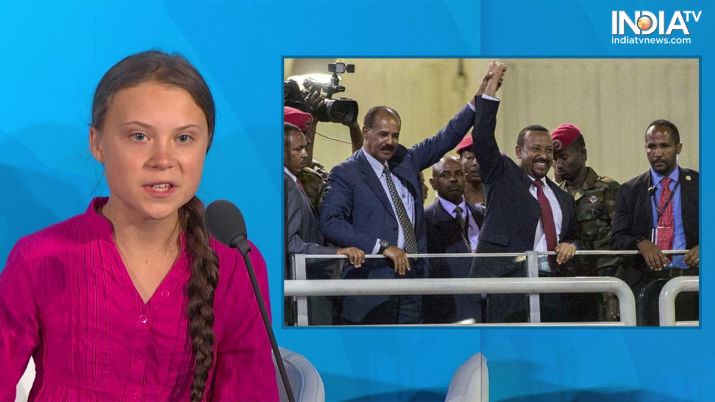
Ethiopian Prime Minister Abiy Ahmed Ali has been awarded the prestigious Nobel Peace Prize for 2019, defeating Swedish climate activist Greta Thunberg. The Norwegian Nobel Committee chose Ethiopian Prime Minister Abiy Ahmed Ali as the Nobel Peace Prize winner 2019 for his efforts to achieve peace and international cooperation. The Nobel Peace Prize 2019 award has gone to the Ethiopian Prime Minister particularly for his decisive initiative to resolve the border conflict with neighbouring Eritrea. The Nobel Peace Prize 2019 also recognises all the stakeholders working for peace and reconciliation in Ethiopia and in the East and Northeast Agrican regions.
Story of Ethiopian PM Abiy Ahmed Ali’s peacemaking efforts:
Abiy Ahmed Ali assumed office as the Ethopian Prime Minister in April 2018, he was clear on resuming peace talks with Eritrea. In a bid to end the long “no peace, no war” stalemate between the two countries, Abiy Ahmed worked out certain principles of a peace agreement in close cooperation with President of Eritrea Isaias Afwerki. These principles are set out in the declarations that Ethiopian Prime Minister Abiy Ahmed Ali and President Afwerki signed in Asmara and Jeddah last July and September. What came as a breakthrough was Abiy Ahmed’s unconditional willingness to accept the arbitration ruling of an international boundary commission in 2002.
Both Prime Minister Abiy and President Afwerki helped formalise the peace process between the two counties. Prime Minister Abiy has initiated important reforms in Ethiopia that give many citizens hope for a better life and a brighter future. In his first 100 days as Prime Minister, Abiy lifted the country’s state of emergency, granting amnesty to thousands of political prisoners, discontinuing media censorship, legalising outlawed opposition groups, dismissing military and civilian leaders who were suspected corruption, and significantly increasing the influence of women in Ethiopian political and community life. Prime Minister Abiy also engaged with other peace and reconciliation processes in East and Northeast Africa. The Norwegian Nobel Committee sees Abiy Ahmed as the person who in the preceding year has done the most to deserve the Nobel Peace Prize for 2019.
On a day when the Nobel Peace Prize 2019 is announced, we remember 16-year-old environmental activist Greta Thunberg too for her histrionics at the United Nations last month. The young Swedish activist furiously attacked world leaders at the United Nations with a fiery speech, and asked: “How dare you?”. Not just that. Greta’s stare at US President Donald Trump when he arrived to attend a meeting on religious freedom was also caught on camera. She was hailed by some, and criticised by some. A lot many had predicted Greta Thunberg as the Nobel Peace Prize winner, but that clearly didn’t happen.
ALSO READ | Swedish climate activist Greta Thunberg wins Alternative Nobel
ALSO READ | ‘A very happy young girl…’: Greta Thunberg after Trump’s remark
Leave a Reply